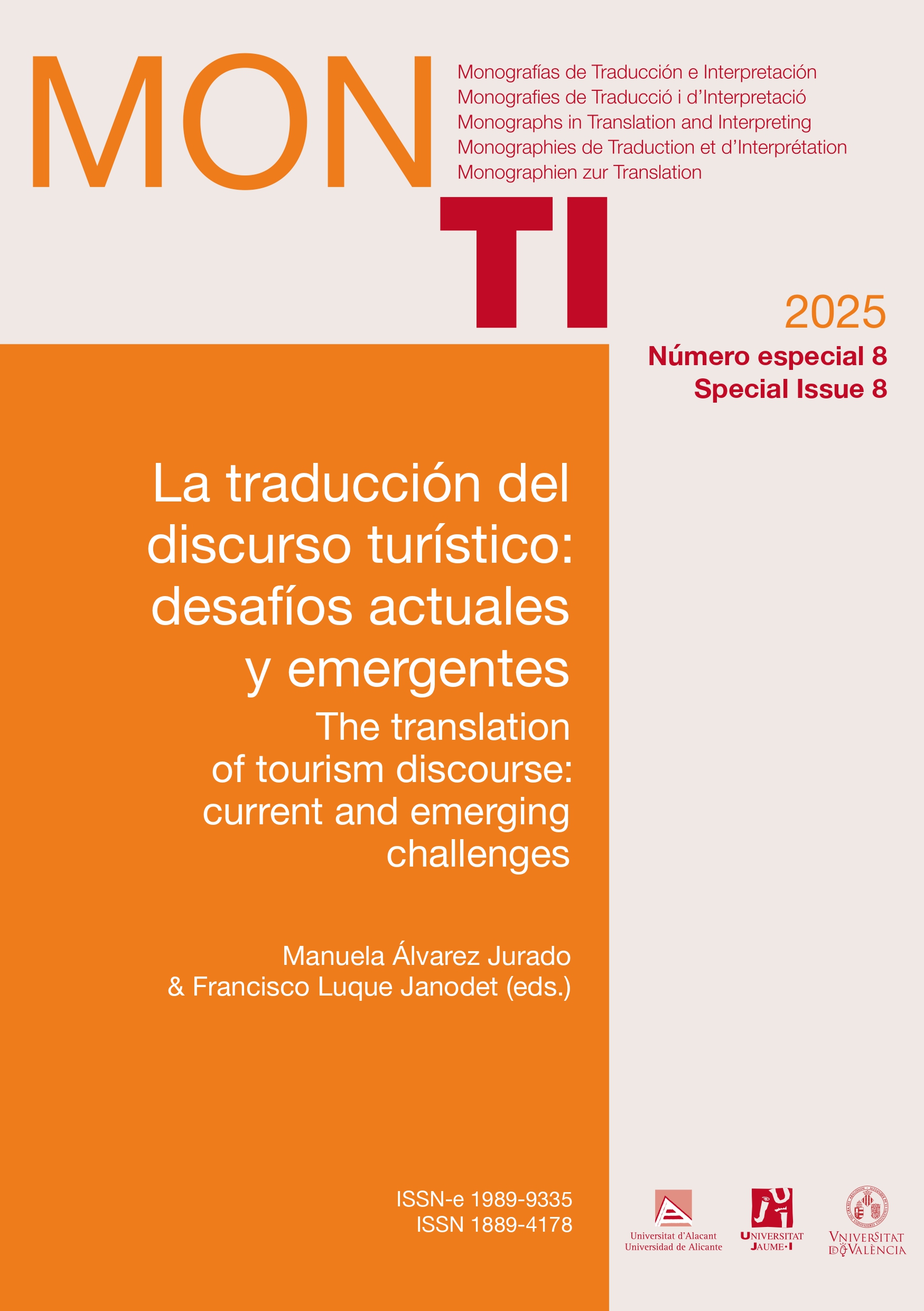Translating sustainability in tourism promotional texts.
Main Article Content
Abstract
Practices of persuasion through language are believed to enhance the decisions of addressees and the image a destination has on the customer, as language enhances the associations that tourists draw to the destination. The purpose of this article is to look at how sustainability is realised linguistically in tourism texts, sprung from the general turn towards alternative, soft types of tourism, as an antidote to years of what is called mass tourism and “irresponsible” practices.
Through the examination of Greek-English parallel texts and pairs of translated official tourism texts, drawing on notions such as the tourist gaze (Urry, 1990/2002/2011), notions of strangehood and authenticity as well as the construction of host/tourist roles, this article seeks to explore linguistic choices promoting values linked to alternative/soft types of tourist activity. Differences across languages are believed to reveal cultural variation in the promotion of sustainable practices.
Downloads
Article Details

This work is licensed under a Creative Commons Attribution 4.0 International License.
The documents contained in these directories are included by the contributing authors as a means to ensure timely dissemination of scholarly and technical work on a non-commercial basis. It is understood that all persons copying this information will adhere to the terms and constraints invoked by each author's copyright. These works may not be reposted without the explicit permission of the copyright holder.
References
ADAB, Beverly & Cristina Valdés (eds). (2004) “Key debates in the translation of advertising material.” The Translator 10:2, pp. 329-353.
BAUSCH, Thomas et alii. (2021)” Sustainable tourism: the elephant in the room.” Sustainability 13:15, 8376.
BIELSA, Esperança. (2010) “Cosmopolitanism, translation and the experience of the foreign.” Across Languages and Cultures 11:2, pp. 161-174.
BOYER, Marc & Philippe Viallon. (1994) La communication touristique. Paris: Presses Universitaires de France.
BUHALIS, Dimitrio et alii. (2023) “Editorial: Tourism 2030 and the contribution to the sustainable development goals: the tourism review viewpoint.” Tourism Review 78:2, pp. 293-313.
CALVI, Maria Vittoria. (2022) “Introducción: diversidad lingüística y traducción de textos turísticos.” Estudios de Traducción 12, pp. 1-2.
CAPPELLI, Gloria. (2006) Sun, sea, sex and the unspoilt countryside: How the English language makes tourists out of readers. Pari: Pari Publishing.
DANN, Graham M.S. (1996) The language of tourism. A sociolinguistic perspective. Wallingford: CAB International.
DANN, Graham M.S. (2002). The Tourist as a Metaphor of the Social World. Wallingford: CAB International.
DEL SAZ RUBIO, Milagros. (2000) La cortesía lingüística en el discurso publicitario. Valencia: Universitat de València.
DELANTY, Gerard. (2006) “The Cosmopolitan imagination: Critical cosmopolitanism and social theory.” The British journal of sociology 57:1, pp. 25-47.
DJAFAROVA, Elmira. (2017) “The role of figurative language use in the representation of tourism services.” Athens Journal of Tourism 4:1, pp. 35-50.
HELLER, Monica et alii. (2014) “Introduction: Sociolinguistics and tourism – mobilities, markets, multilingualism.” Journal of Sociolinguistics 18:4. pp. 425-458.
HOFSTEDE, Geert & Gert Jan Hofstede. (2005) Cultures and Organizations-Software of the Mind. New York: McGraw-Hill.
JAWORSKA, Sylvia. (2017) “Metaphors we travel by: a corpus-assisted study of metaphors in promotional tourism discourse.” Metaphor and Symbol 32:3, pp. 161-177.
JAWORSKI, Adam & Annette Pritchard (eds.). (2005) Discourse, Communication and Tourism. Clevedon: Channel View Publications.
KEFALA, Stavroula. (2020) “The translation of tourism advertisements.” In: Sidiropoulou, Maria (ed.) 2020. Aspects of Meaning-making through Translation. Athens: Patakis, pp. 171-196.
KEFALA, Stavroula. (2021) “The pragmatics of translated tourism advertising.” Journal of Pragmatics 173, pp. 88-100.
KEFALA, Stavroula & Maria Sidiropoulou. (2016) “Shaping the glo/cal in Greek-English tourism advertising: a critical cosmopolitan perspective.” Languages in Contrast 16:2, pp. 191-212.
MALAMATIDOU, Sofia. (2019) “Nature-based tourism in Greek and English with reference to translation.” In: Meng Ji (ed.) 2019. Translating and Communicating Environmental Cultures. Oxon: Routledge, pp. 218-246.
MANCA, Elena. (2013) Describing through the five senses. A contrastive socio-cultural and linguistic analysis of Italian and British tourist websites. University of Salento. Online version: http://siba-ese.unisalento.it/index.php/tourismandtourist/article/view/13606/12024
MCDONALD, Janine Robyn. (2009) “Complexity science: an alternative world view for understanding sustainable tourism development.” Journal of Sustainable Tourism 17:4, pp. 455-471.
MOIRA, Polyxeni et alii. (2017) “The application of slow movement to tourism: is slow tourism a new paradigm?” Journal of Tourism and Leisure Studies 2:2, pp. 1-10.
ROKOWSKI, Patricia Edwards. (2006) “The language of tourism: multidisciplinary theory behind the practice”. In: Navarro Ignasi & Maria Nieves Alberola Crespo (eds.) 2006. In-roads of language: Essays in English studies. Castelló de la Plana: Universitat Jaume I, pp. 103-122.
SIDIROPOULOU, Maria. (ed.) (2021) Aspects of Meaning-making through Translation. Athens: Patakis.
SIDIROPOULOU, Maria. (2012) “Greek and English linguistic identities in the EU: a translation perspective”. Pragmatics and Society 3:1, pp. 89-119.
STEVENSON, Nancy. (2012) “Using complexity theory to develop understanding of tourism and the environment”. In Holden Andrew & David Fennel (eds.) 2012. Handbook of Tourism and the Environment. London: Routledge, pp. 84-93.
SULAIMAN, M. Zain and Rita Wilson. (2019) Translation and Tourism: Strategies for Effective Cross-Cultural Promotion. Singapore: Springer.
THURLOW, Crispin & Adam Jaworski. (2011) “Tourism discourse: Languages and banal globalization.” Applied Linguistics Review 2, pp. 285-312.
Urry, John. (1990/2002/2011) The tourist gaze: leisure and travel in contemporary societies. London: Sage Publications.
Urry, John. (1995) Consuming Places. London: Routledge.
URRY, John. (2005) “The ‘Consuming’ of Place”. In: Jaworski, Adam & Annette Pritchard (eds.) 2005. Discourse, Communication and Tourism. Clevedon: Channel View Publications, pp. 19-27.


